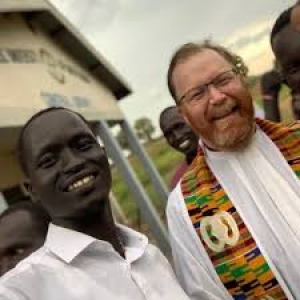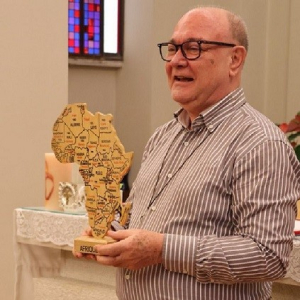Peter MALONE
MSC International, South Sudan, a story from Alan Neville MSC, Ireland
MSC International, South Sudan, a story from Alan Neville MSC, Ireland
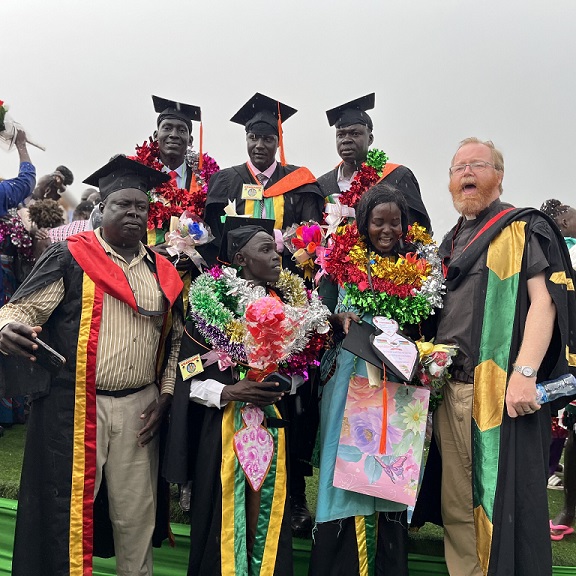
Malaria
On Sunday evening I was getting ready for the week ahead, planning for the work in the University and the schools, when I began to feel unbearably cold. A quick check with one of our nurse practitioners confirmed my suspicions. I had my first bout of malaria. If you haven’t had it, it’s difficult to accurately describe. Your fever alternates between being roasting hot and then freezing cold. It’s bizarre to ever think you will end up shaking with the cold, in bed with two blankets, when the room temperature is well into the 30C, but there I was. Thankfully the Sisters moved me into the Convent to keep an eye on me. Hardly necessary in my opinion, as all the world knows how easy Irish men are as patients. You’d hardly think we were sick at all! I was thankful for their care by the time I finished.
Anyway, aside from fever, there are headaches, body aches, nausea, and lots of other things that are perhaps not fit to print. The vivid dreams were something of a shock. In one in particular I found myself at a Eucharistic Congress in a large stadium, when a runaway train barrelled through the proceedings. I hopped on for fun, managed to avoid hitting three trams, before eventually crashing the train just outside a Spar in Ireland. The manager came out to thank me, took my photo, gave me flowers and chocolate, and then charged me for both of them, which I thought was a bit much.
Now, rambling, nonsensical vivid dream aside, the harsh reality is that malaria is easily one of the main causes of child death in our area. It always bothered me that at the end of the first year pandemic we had six or seven viable vaccines available. Malaria kills over 600,000 people a year, but still we are waiting on a vaccine. Simply put, rich people don’t get malaria, so there is not impetus to find a cure in the same way we came together to tackle Covid. The part of malaria that is most responsible for deaths is the fever. Young children often don’t have the strength to deal with the high temperatures, but all that is needed to reduce their temperature is a simple paracetamol.
It took five days for me to get over my first experience of malaria. I was lucky to have a clinic nearby, access to medication, and a caring community. Not everyone is. That is why the work of not just the school, but the clinic here is indispensable. Life has its highs and lows, and as we give thanks for one, we must remind ourselves to work to help those in the other. That is what Christ demands of us. Nothing less will do.
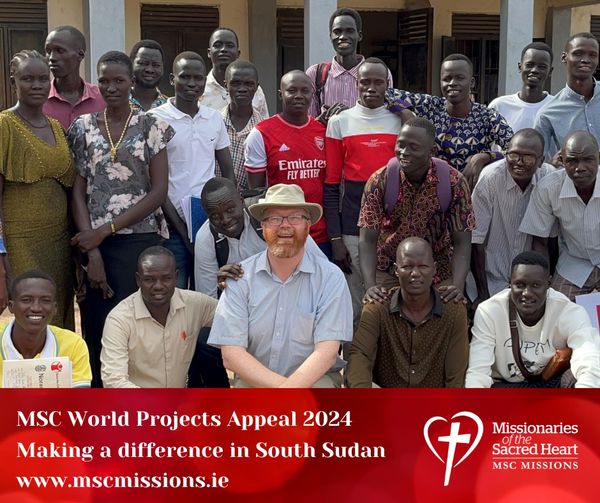
Developing our Misacor website
Developing our Misacor website
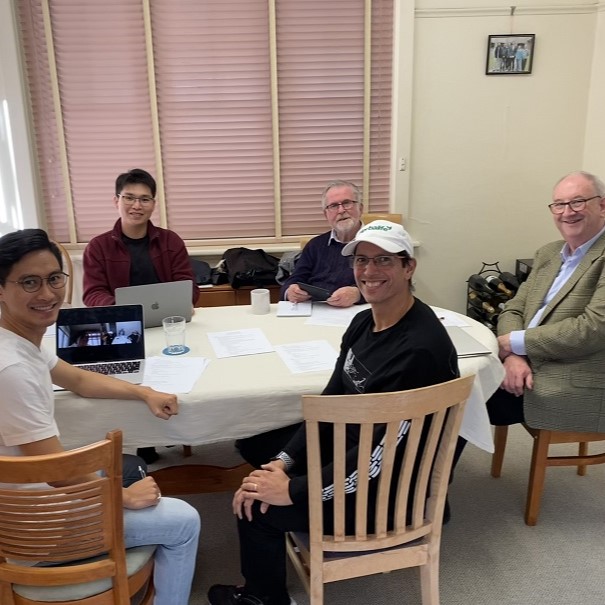
Monday, May 6th saw a meeting to discuss and plan the development of our website, a wide-ranging consideration of our outreach, our content, our design, updating technology, improving content and accessibility.
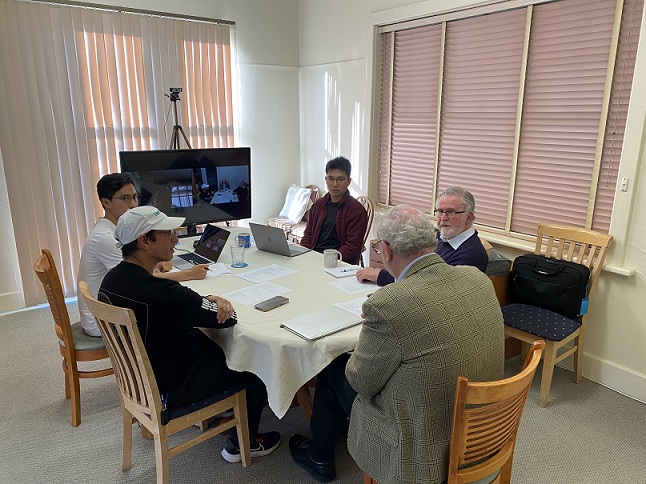
Those participating: Stephen Hackett, Peter Malone, Kenji Konda, Trieu Nguen, Hoa Tran, Deacon Michael Hangan, adviser and web designer, ‘Transformation By Design’, Matthew Price (who has worked for diocese and religious congregation sites since 1999), who has been advising and helping us in recent years. Matt lives in Croydon and his children attend and have attended the Sacred Heart parish school on the site of our former house of studies.
Kenji and Michael participated by Zoom from Gifu, Japan, and Hobart. Everybody else was present at Cuskelly House, Blackburn.
So, we are encouraged and re-energised.
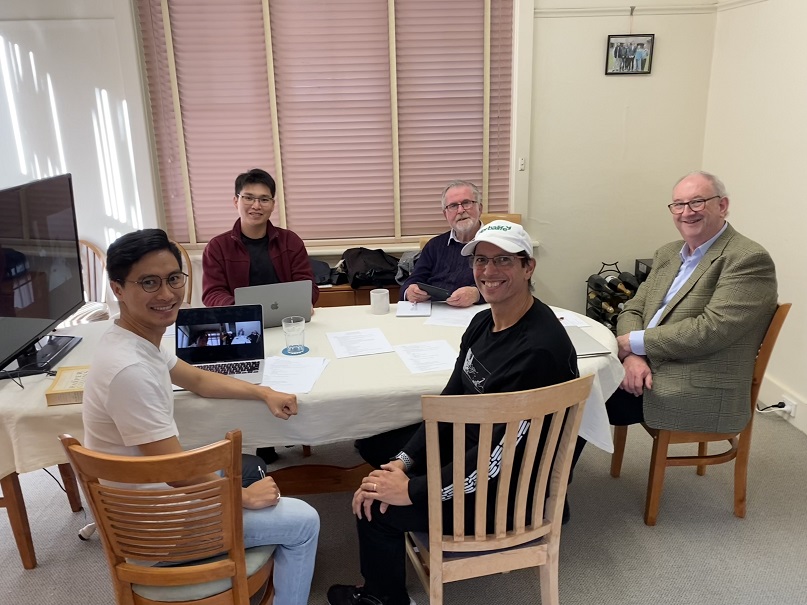
Origin

ORIGIN
US, 2023, 141 minutes, Colour.
Aunjanue Ellis-Taylor, John Bernthal, Niecy Nash, Emily Yancey, Finn Wittrock, Victoria Pedretti, Jasmine Cephas Jones, Isha Blaaker, Vera Farmiga, Audra McDonald, Connie Neilson, Blair Underwood, Nick Offerman, Myles Frost, Suraj Yengde.
Directed by Ava DuVernay.
The title, Origin, is significant. However, more significant is the word, Caste. In fact the film is based on the book by Isabel Wilkerson, Caste: the Origins of our Discontent. And, checking on the general meaning of caste: any class or group of people who inherit exclusive privileges or are perceived as socially distinct. We note that the word “socially” is underlined and the film will show that this is a key understanding of differences rather than racism, remembering the unity of race in India and the classic example of a caste system.
This sounds as if this film is something of a seminar on social issues. And, in many ways, it is. However, there is also a strong narrative, the story of Isabel Wilkerson herself and a powerful performance by Aunjanue Ellis-Taylor, her background, African-American, her family, especially her relationship to her mother who is going into care, a loving relationship with her husband, white, played by John Bernthal. And it is a film about her career as a Pulitzer prize-winning author, urged by a friend to explore race issues in the United States but this leading her to her exploration of the meaning of, significance of, living of, caste.
There are quite a lot of discussion scenes but the film also uses the device of telling stories within stories. We receive a shock when Isabel looks at a photo in a gallery, Nazi authorities gathered for a meeting and then this is dramatised, the dialogue is about ridding Aryan society of the Jews, but looking at American legislation, Jim Crow laws, which they think of incorporating into 1930s German law. And this is illustrated by a mass rally, everybody with the Nazi salute except one, a young man who wants to marry a Jewish girl. And the consequences of this relationship and the authorities is shown brutally.
Another illustration is the story of two couples going undercover in the southern states, one black, one white, academics who are investigating and writing reports. One telling sequence has the sheriff driving through the white area to smiles and applause, then driving through the black area, scowling and the residents with impassive, blank faces.
And, towards the end of the film, a very moving anecdote, an old man reminiscing about 1951, an African-American boy in the Little League, not allowed into the swimming pool, the guard declaring it would have to be decontaminated if he touched the water.
There are also some palpable interviews, compounded by the grief at the death of her husband, the needs of her mother, discussions with her sympathetic cousin, terminally ill, and a telling sequence with star Audra McDonald as Miss Hale, remembering the school principal condemning her for looking him in the eye and rebuking her for demanding to be called Miss at her trying to explain that this was her actually given name.
Isabel Wilkerson also goes to India, visual images of the caste system, a very jolting sequence about the Dalits and their having to clean sewers by hand for the privileged castes.
This is a long film, serious-mindedly directed by Ava DuVernay (Selma), interesting in its storytelling but demanding in its challenge to the audience to acknowledge racism but to explore the idea of caste, and the sad and sometimes savage effects of this kind of privilege superiority over those considered lesser mortals.
- A challenging film, narrative, portrait of the author, the story? But a film of issues?
- The writing-director the film career, experience, African-American, race issues?
- The period, the 2010s, the range of flashbacks? Isabel as a character, journalist, Pulitzer Prize-Winning author, relationship with Brett, life with him, his being white? Her relationship with her mother? Her mother in care? Institution? Her career, the publishers and challengers? The details of her life with Brett, the relationship? The details of her relationship with her mother? With her cousin? The clash with Brett, the suddenness of his death, the funeral and sadness? Her mother, advice, her mother’s death?
- The publishers, contact with her, at the social, the interview with the journalist, his urging her for further research? Pause after the deaths of Brett and her mother, going back to writing, beginning her research, the various visits and testimonies, their being visualised? Her visit to India, the discussion with the professor about caste? The aspect of selling the house, her memories there, the house repairs and the visit of the plumber, discussions with him? And the resumption of this theme at the end and her walking through the renovated house?
- The character Brett, White, the marriage to Isabelle, supporting her, the discussions, the challenge? The suddenness of his death?
- The mother, her wisdom, the relationship, care, her death?
- Marion, the bond with Isabelle, the discussions, her advice, the terminal illness, Isabel in India, communicating with her, the phone calls?
- The interview with Miss, telling her story, her name being Miss, the principal not believing it, looking in the eye, and his reaction to her direct approach? The contribution of her story?
- The visualising of the couple who went undercover, black and white, their personalities, relationship, their expertise, their decisions on research? The south, the visuals, the scene with the sheriff driving through the white community and waving, smiles, kowtowing? The contrast with his drive-through the black area, the silent faces, no response, his sternness? The couple being embedded, their experiences, their writing, the achievement, the photos at the end?
- Germany, the 1930s, the picture, the dramatising of the picture, issues of the Nazis, superiority, the Jews, looking at American legislation and racism embodied in law, their motivations, race, the humiliation of the Jews, the visualising of the couple, his not saluting, her being Jewish, their time together, the attempt to escape, the arrest, the consequences?
- The old man reminiscing, 1951, the little league game, the African-American boy, shared triumph, not allowed in the pool area, not in the water or it would have to be decontaminated, the pressure from the coach, laughed on the water, the Ranger, the boy not being allowed to touch the water, outside again, and the people passing him food? The old man and the regrets and his memory?
- The theme of caste, the explanations, common humanity of the possibilities of being superior to others, the example of caste in India, Isabelle and her visit, the discussions with the professor, her observations of life in India? The visuals of the delegates, the humiliation, use of cleaning the toilets with their hands and visuals of this as an overpowering example for the film audience?
- The challenge to the audience, expectations about race, racism, the visuals of American slavery, India, and Martin Luther King’s visit to India in the 1950s?
- Isabel and her writing, ultimate success, the support of the editors, the publication?
- The challenge to the audience to understand this idea of caste versus racism, the discussions, the speeches, the clarifications, and the elaboration of the pillars of caste?
- The impact of the film for an American audience? For audiences outside the US?
Boy Kills World
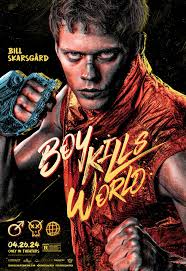
BOY KILLS WORLD
US, 2023, 111 minutes, Colour.
Bill Skarsgaard, Jessica Rothe, Michelle Dockery, Brett Gelman, Isaiah Mustafa, Yayan Ruhian, Quinn Copeland, Sharlto Copley, Famke Janssen. Voice: H.Jon Benjamin.
Directed by Moritz Mohr.
It is probably best to give an alert immediately. This is an action fantasy but at times it is a wallow in what a clockwork Orange calls "a bit of the ultra-violence," which can best be defined as excessive or even over the top levels of brutality – Alex and his droogs would certainly enjoy it.
This is a highly macho show, not much female interest until the finale, but the filmmakers seem to have a younger audience in mind, a macho junior kind of entertainment.
Throughout the film, with its totalitarian futuristic city, its purge, this time called “The Culling”, with its initial reminders of The Hunger Games, and, in the latter part, a television musical special parallel with the gladiatorial combats of The Hunger Games, there were constant reminders of Graphic Novels, the panels of cartoon action, the dialogue in the bubble of the cartoon panel. Which means, of course, that it is not meant to be taken as realistic in any way. It is a fantasy.
Then, the final credits are exactly that, a whole range of cartoon characters and action, of graphic novel comic panels, the instant action, the cartoon-style dialogue, the stylised impact.
The overall plot is basically interesting, an explanation of the domination of the leader, Hilda Van Der Koy (Famke Janssen) the ruthlessness of The Culling, the execution of a very nice family, the survival of the boy (Bill Skarsgaard, Pennywise in the It movies), his being trained by a shaman in the jungle, lots of episodes of martial arts, combat, motivation to have his revenge on Hilda Van Der Koy. The boy is deaf but there is an inner gruffly aggressive voice, and regular appearances of his executed little sister, a kind of Anama figure trying to control his passionately aggressive Animus.
In fact, the action gets very quickly into the attack, and here is the wallow in the ultraviolence, combats, fights, deaths galore. There are also some nasty characters, Sharlto Copley as Glenn, a clownish spokesman on behalf of the regime, violently ruthless, but then we see his even more ruthless wife, in control of the state, Melanie Van Der Koy, Michelle Dockery a long way from Lady Mary at Downton Abbey. But, the boy finds two allies who are able to join him in the combats, rescue him when captured, lead to the final confrontation.
And, it takes place in the staging of a television special, song and dance, vast sets, studio audience (definitely reminding us of The Hunger Games) but the victims of the culling on stage and being hunted down and killed ruthlessly. But, when the boy and his associates go into action, the villains being hunted down and killed even more ruthlessly.
Perhaps a word that needs to be introduced into reviews of this kind of action show is “slaughter”.
However, interest is certainly raised when there is quite an unexpected twist at the end, dramatic.
The office of classification has given Boy Kills World an MA certificate, and references blood and gore.
T-34
T-34
Russia, 2018, 139 minutes, Colour.
Alexander Petrov, Irina Starshenbaum, Viktor Dobrobravof, Vinzenz Kiefer.
Directed by Aleksey Sidorov.
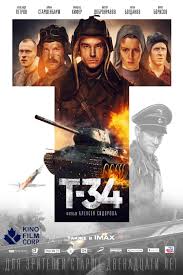 A different perspective on World War II films. This time it is from Russia, and recreation of battles on the Russian front near Moscow, in an extraordinary tank escape from a German prisoner of war camp. For audiences who love tank action, especially in World War II films, this is a must.
A different perspective on World War II films. This time it is from Russia, and recreation of battles on the Russian front near Moscow, in an extraordinary tank escape from a German prisoner of war camp. For audiences who love tank action, especially in World War II films, this is a must.
The opening sequence involving two Russian soldiers in the vehicle being pursued by a number of tanks and an intense German commander, their skills in being able to evade rockets and can gingerly drive is certainly adrenaline-pumping and filmed and edited skilfully. Then, a town in Moscow has to be evacuated and the commander and one tank only available for fending off the Germans. Once again, this sequence is quite extraordinary in the manoeuvres, concealment, anticipating German moves,
The second part of the film takes place in a German prisoner of war camp where the crew of that defending tank have been captured and imprisoned. And the German commander from the siege of Moscow is here, and they have T-34 tank full of dead Russians which needs to be reconstituted and to be used then by the Germans. Commander is unwilling but the German holds the translator as a hostage, threatening to shoot. The commander then chooses his old crew for the refurbishment of the tank that, cleverly getting permission to bury the dead Russians in the tank, takes the remaining weapons and conceals them.
What follows is even more action with the tanks, within the camp and destruction, and on the Road, pursuit, escaping through a town, through the forests.
Perhaps the plot is plausible – but there is no indication that the film is based on facts. Rather, the film is dedicated to all tank drivers in wars.
- A different World War II story? Russian perspective?
- Audience familiarity with the German invasion of Russia? Previous alliance between Hitler and Stalin? The attack on Russia, Russia and the Allies? The Germans underestimating the Russians, underestimating the Russian weather?
- The opening, the town, the Germans, the defence group? The focus on the two in their vehicle, the slashing of the signed to Moscow? The pursuit, the skill in evading the Rockets? Their getting back to safety? The situation in the town, the hospital, evacuating? Nikolai and his being put in charge, the small team, their initial scepticism, his claiming his good training, but lack of experience on the front? The collaboration?
- The detail of the strategy to do the Germans, the mobility of the tanks, the skill of each member of the crew, the commander and his tactics, the driver and his skills, the firing of the bombs? Hiding on haystacks, anticipating the moves of the Germans, tricking them? The focus on the German commander, the tank, his aggression, the destruction of all the tanks? Nikolai on the street, the German shooting him?
- The transition to the German prisoner of war camp? The Russians and their presence, the commander wounded? The irony of the German commander and his role in the camp? The interviews, the Russian translator? German proposal, the captured Russian tank, to get rid of the corpses, to repair the tank and have it in service? The commanders refusal, the German threatening to shoot the translator, relenting?
- The parade, his choice of those working with him, his choosing his former, comrades? Their initial wariness? Trusting him? The going to work, the corpses, the machine, the driver and his admiration of the tank, their work, the German testing, the completion of the work?
- The tactic of permission to bury their comrades, the German giving it, the taking the ammunition, concealing it?
- The German commanders, the cadets, the training?
- The plan for the Russians, demonstrating the mobility of the tank, the Germans in admiration, the various manoeuvres, the involvement of the cadets, then the escape?
- The drama of the escape in pursuit? The Smoke screen, the mobility of the tank, the skill of the driver, coming into different angles, shooting at the commanders? The desperation, the calls to Berlin, the threats of the authority to the German for his success?
- The different manoeuvres, the skill of the Russians, the destruction of the German tanks, driving through the countryside, keeping out of sight, side roads, aiming for the Czechoslovakian mountains?
- The help of the translator, her getting permission to go outside, her taking the maps, the rendezvous, her being collected and travelling with the group?
- The night, the encampment, the relationship between the translator and the commander? Going into the town, the people surrendering, collecting the food and drink? Fitting in the night, the river, the swimming – and since freedom?
- The manoeuvres at the end, the German pursuit, blocking the roads, their taking side roads, using their ammunition will, though limited, the member of the team getting into the German tank and destroying their command, his interventions?
- The relish of the Russians, the driver and the success?
- The buildup to the confrontation between the two men, the tank at the cliff, reaching out of the hand, the tank going into the water?
- The success, picking up the translator, the journey to freedom?
Civil War

CIVIL WAR
US, 2024, 109 minutes, Colour.
Kirsten Dunst, Wagner Moura, Cailee Spaeny, Stephen McKinley Henderson, Nick Offerman, Nelson Lee, Jesse Plemons.
Directed by Alex Garland.
The US has had a Civil War so it is not unthinkable that it could have another. Many observers from around the world might think that, in fact, the uprising and riots on January 6, 2021, the rabble invading the Capitol, the stance of the defeated President, indicated, at least, a divided America.
British writer and director, Alex Garland (who shown a liking for apocalyptic themes (28 Days, The Beach, Ex Machina, Annihilation) has been observing the divisiveness in America and created this story of a Civil War, in the not too distant future. In fact, so much of the film looks contemporary.
We are introduced to a situation where an embattled President broadcasts a speech, desperately, having intervened militarily in situations, some states seceding (rather unlikely union between Texas and California!). Troops marching on Washington DC.
While there are military encounters, especially the siege of Washington and the attack on the White House and the President, immersing the audience right in the middle of it, the point of view of the screenplay is that of a group of photojournalists, based in New York, New York where there is a disturbing protest, a bomb blast in the middle of the protest, police action, and the journalist with their cameras ready. The group decides that they will risk the travel to Washington to try to interview the president before any final disaster.
We are introduced to the group of journalists, familiar from so many movies, gathered in a hotel, plans, rivalries, dangers. The leading personality is a battle-scarred veteran, Lee, Kirsten Dunst, working with Joel, Wagner Moura, enterprising but more cautious. Lee has come across a young woman shaken up by the explosion, Jesse, Cailee Spaeney, discovers that she wants to be a proto-journalist, has come from Missouri, and, reluctantly, is taken up by the group, accompanied by an old veteran, Sammy, Stephen McKinley Henderson. The roads are dangerous and they have to travel to DC in a roundabout route.
Civil War then becomes a literal road movie, a succession of different incidents revealing what is going on in the American countryside, plenty of roadblocks, encounters with soldiers, having to take shelter from a sniper in a mansion, going through a town where everything seems normal, including a clothes shop, the citizen seemingly complacent, then the vision of soldiers on the roofs of the buildings. In West Virginia, there is a sports complex, people taking refuge on the central arena, in the seats, suspicious but the inhospitable.
There is a powerful sequence, truly upsetting and highlighting ideological stances, a group of soldiers, a truck full of corpses, then tipping them into a vast open grave, a confrontation with the journalists, especially with two journalists who join them, Asian backgrounds. The soldier, uniformed, on guard, is played as the grimly violent patriot, an embodiment of Make America Great Again, supremely self-assured, and, unhesitatingly, shooting the Asians.
And, all the time, the group are taking photos, many in seemingly impossible situations, and on the screen, we see the black-and-white versions of so many of the photos, jolting.
It is something of a surprise to find that Civil War has done very well at the box office, that it has found an audience, but it would be very interesting to interview members of the audiences as they came out of the cinema, and discover what liberals thought of it and what the conservative right made of it!
- Expectations from the title? Memories of the American Civil War? Civil War in the future? The 21st-century and the ideologically divided America?
- The director, British background, interest in futuristic and apocalyptic themes?
- The situation, the President’s speech, the audience gaging his stances, his appeal to the people, the civil war situation, his military interventions? Secession of States? California and Texas? The uprising against him? The generic nature of the issues rather than detail?
- The New York opening, the protests, the bomb, the injuries? The introduction to the photojournalists, their involvement, daring, the close-ups, Jessie being injured, Lee helping her, Jessie and her ambitions of being a photojournalist? The refuge in the hotel?
- The hotel, the journalist gathering, the atmosphere, tensions, journalist ambitions, photojournalists? The discussions, the rivalries? The introduction to , Joel his experience, his wanting to interview the president? Lee, her association with Joel, her ambitions? Jessie and her wanting to join them, her age, and experience? The friendship with Sammy, his age, his experience, wanting to go along as well?
- The road journey, different faces of America, from New York State, West Virginia, Pennsylvania, to Washington DC? The impact for the audience, to understand something of the Civil War?
- The effect of the various episodes, the car, the travel, the interactions between them, Joel, his attitude towards Jessie, her being forthright, Sammy and his experience? Lee in charge? Service station, the encounter, the deals, guns, Mansion with the sniper and being with the soldiers shooting back? West Virginia Stadium, the people gathered, hospitality, food? The quiet town, the shops open, seemingly normal, soldiers on the roofs? Tension?
- The work of photojournalists, always alert, looking for the angle, close-ups, and the device of having the audience see the photos in black-and-white? Adding to the drama?
- Tony and his associate, Asian background, linking up with the group? The encounter with the Patriot soldiers, the truck and the corpses, emptying them into the pit? The soldier, his stances, right-wing patriotism, his speeches and declarations, the challenge, the arguments, confrontation, the guns, his being shot?
- The effect on the photojournalists, nearing Washington, the encounter with the encampment, the soldiers, the embedded journalists, the discussions?
- Going into DC, the siege of Washington, the intense military action, the focus of the group, their access, continually taking photos, the extreme situations? Eventually to the White House, the confrontation with the president, the military reaction? His reaction, issue of the interview, his death?
- The cumulative effect of this experience on an American audience? Reflect the situations of 2024 and the presidential election year? The cumulative effect on observers outside the United States? The puzzle about American society, contemporary, the future?
- The portrait of the characters, Sammy and his experience, his death? Joel and his intensity, hesitations? Jessie, ambitions, the dangers, the violence? The common by the two women of the families back in Missouri and Colorado oblivious of the war? Lee and her leadership?
Taste of Things, The/ La Passion de Dodin Bouffant

THE TASTE OF THINGS/ La passion de Dodin Bouffant
France, 2023, 135 minutes, Colour.
Juliette Binoche, Benoit Magimel, Emmanuel Salinger.
Directed by Anh Hung Tran.
The title is a bit generic! But it does lead us in the way of food. Perhaps the original French title, La passion de Dodin Bouffant, which actually indicates the narrative of this story, seem too cumbersome for the English version.
Chef, menu, restaurant, gourmet, all words that lead us to France and French cuisine. And, for 135 minutes, this is a film, with extraordinary detail, about French cuisine. No idea here of just rustling something up for the evening meal!
What is immediately attractive about the presentation is that this is a period drama, an elegant 19th century mansion, costumes and decor, a slower paced atmosphere, inviting the audience in, to become more quiet, to observe, to wonder…
In fact, for the first 30 minutes of the film, there is a detailed step-by-step preparation of a meal – an ordinary meal in this household rather than a banquet even though the dishes prepared would serve beautifully at a banquet. This is the household of Didon Bouffant who is a master chef. And he is assisted, for over 20 years, by Eugenie, obviously in love with her but her refusing his proposals. Eugenie is seen gathering the vegetables in the garden, then that half-hour in the kitchen, such preparation of each of the ingredients for the meal, the vast fire stove, the utensils, the attention given to preparing fish, meats, vegetables, sauces, precision with tastes and the time for cooking…
And, of course, beautiful desserts. We feel we are there. And there are still more meal preparations to come. And the guests savouring the meals. And a celebration for Eugenie herself.
Obviously, this is a film for audiences who value food, who appreciate preparation and cooking, who have a discriminating sense of taste. For audiences who do not, especially with fast-food habits and taste to match, this film will be a challenge – or, perhaps, too detailed, even boring.
The film was written and directed by Vietnam-born, Ahn Hung Tran, directors of Vietnam themed films like The Scent of Green Papaya, Cyclo. The screenplay is based on a book by Marcel Roufe (1877-1936, drawing on his own experiences of that period). There had been a French movie for television of his book in 1972.
Juliette Binoche has been wonderful in films for over 30 years and brings an extraordinary charm and strength to Eugenie, an older woman, cooking her life, working with Dodin in the kitchen, supporting him in his meeting this with business associates from the area, but not wanting to sit and eat with them though she has strong friendships with them. Dodin is played by veteran actor, also charming, Benoit Magimel.
There is a pleasant subplot, the assistant cook and her younger sister helping out, and Eugenie’s discovery that the young girl is gifted with all kinds of culinary talents, and the desire for her to become an apprentice in the kitchen, her parents initially wary, but the young girl eager to learn.
And for the Romantics in the audience, the gently-pleasing relationship between Eugenie and Dodin, genteel, restrained, and his growing concern about her health.
So, what else can a reviewer say, except that the film is so beautiful to look at, the cast is charming, and the food, preparation, cooking, serving…Parfait!
- The tone of the English title? The essence of the French title?
- French sensibility, food, cooking, gourmet? Audience response?
- The period, 19th century style, pace, costumes and decor, the mansion, the interiors, the garden? The focus on the kitchen, the detail, the dining room? Eugenie’s room? The musical score and tone?
- The situation, Dodin, his ability as a chef, cook, social status, his associates, his work in the kitchen, his hosting the dinners, his relationship with Eugenie, in love, the proposals, her refusals, the quiet intimacy between them? The Prince and his visit, the program of the eight-hour dinner? The issue of Eugenie’s health? The staff in the kitchen, the assistant, her niece, the talent, hope for the future?
- Eugenie, age, experience, longtime cooking, the relationship with Dodin, 20 years, love, refusing the proposals? Seen in the garden picking the vegetables, her work in the kitchen, meticulous attention to detail, with the assistant, with the young girl, appreciating her talent, finalising the meals, their being served, her not joining the guests? Her quiet life, her health, her fainting, collapses, medical attention? Her death? And the final reprise of the end of the film with her being with Dodin?
- The first 30 minutes, the meticulous preparation of the dinner, so much detail? Audience response?
- The further work in the kitchen, Dodin and his working with Eugenie, the assistant, the approach to the parents of the young girl, their eventually bringing her, her skills, her ambitions, going to work in the kitchen?
- The background of the director, Vietnam, his move to France, his sensibilities?
- For audiences who love food and cooking? The impact for those who tend to be observers than experts on food?
Kindergarten Teacher, The/ Israel

THE KINDERGARTEN TEACHER
Israel, 2014, 119 minutes, Colour.
Sarit Larry, Avi Shnaidman, Lior Raz.
Directed by Nadav Lapid.
An offbeat Israeli film – which was remade four years later in the United States as a star vehicle for Maggie juvenile as the kindergarten teacher, a winner of awards and will reviewed.
The setting is Tel Aviv – and later sequences in the resort town of Eilat,
The central character is kindergarten teacher of two decades, married, a son in the Army, the daughter in school. The scene is set in the meal sequence with her husband, her explaining one of her students who is able to compose poetry, a five-year-old, whom she sees as something of a child wonder in the vein of Mozart.
The film shows the young boy, his background, his wealthy restaurateur father, his mother having abandoned the family, an uncle who is a poet and considered a failure by the family, and the boy brought to school by nanny who is an aspiring actress.
There are scenes of the children and the routines in the school, play, naps… At first the little boy seems withdrawn, then a vigourous scene of play with the school friend, his coming out of himself more, the presentation of a play and the characters of the Maccabees. And then the boys poetry, going into something like a creative trans, pacing up and down, speaking his poems, written down at first by his nanny, and then the teacher collecting them – and a final sequence where at the beach, the boy walks up and down in an out of the water, the teacher copying down the poem in the notebook.
The teacher intervenes to promote the boy, after being really cooled and praised at a session of a righteous course, her approaching the father of the boy who does not want his son to be a poet, gets the nanny fired because she is using the boys poetry in her acting auditions, decides to present the boy reciting his poems that he is ridiculed, then a decision to abduct the boy, taking him to Eilat.
Separate Larry gives a determined performance as the teacher. We are asked to identify with her, share her experiences, her infatuation/obsession with the boy and puzzling about the abduction, his wanting to report her to the police, her giving him the phone number and the eventual arrest.
Israeli commentators on the film see it also has an attack on narrow policies of the Israeli government as regards the parts.
- Israeli film, comment on Israeli society, 2014, government, arts, poetry, Eric policies, protest?
- Television, homes, school, atmosphere? A light, the hotel? The musical score, songs and chants, the Chanukah song?
- The credibility of the plot, the trial genius, poet, the links with Mozart? A five-year-old, his vocabulary and poems, concepts? The routine of his walking up and down when composing? Credible?
- The teacher, her background, relationship with her husband, some in the Army, daughter at school? Two decades of teaching? With the children, the ritual of arriving with good morning, and the activities in the playground, activities in the classroom, the naps? Her observing the children?
- Observing Yellow, playing with his friend, hard on him? The poetry, her fascination, themes, taking it to the poetry group, adverse comments praising comments? Later taking the of the poem about the bullfighter the reactions?
- Walking with You have, the name Agar, is restaurateur father, mother gone, his nanny, her taking him to school, the conversations with the teacher, using the boys poems for her auditions – and the teachers denouncing her to his father and other authorities, getting fired?
- At home, with her husband, sexuality, talking, meals, the celebration for their son and the Army visiting?
- The boys background, the busy father, his uncle and poetry, is uncle despised? The teacher going to see the uncle, the discussion about poetry, his offer of help? Going to see the boy’s father, his being busy, successful, not wanting his son to be a poet, wanting him to be successful in practical enterprises? The firing of the nanny?
- The teacher, her meetings with the boy, the donee giving her the text of problems, her collecting them, the beach scene and her writing down the poems as the boys spoke?
- Her wanting him to be acknowledged, the Mozart comparison, organising a recital, preparing him with questions, his recitations, getting dressed, on stage, the chair, the poems, the previous poet repeating the lines dramatically? The bad reactions, throwing things at the stage? The teacher’s reaction, shielding the boy?
- At the bar, the encounter with the chief protester, the verve in the dancing?
- The decision to take the boy, packing, the journey, going to that, the hotel, the poem, the sea, writing it down?
- The culmination of the drama, the boy and the phone, to say that he had been abducted, the teacher in the shower, calling out, indicating the phone, the number, calling the police, to say she was unarmed?
- The arrival of the police, the rescue and carrying the boy through the holidaymakers at the hotel? The taking of the teacher?
- The credibility of the plot, the boy and his poems, the teacher and her obsession, the abduction, giving him up? The futures?
Lord, Give Me Patience/ Senor, Dame, Paciencia
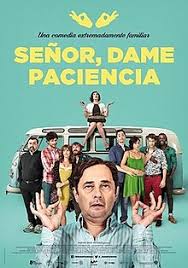
LORD, GIVE ME PATIENCE/ SENOR, DAME, PACIENCIA
Spain, 2017, 95 minutes, Colour.
Jordi Sanchez, Rossy De Palme, Megan Montaner, Sylvia Alonzo, Eduardo Casanova, David Guapo, Salve Reina, Bore Buiila, Andres Velencoso.
Directed by Alvaro Diaz Lorenzo.
This comedy was a very popular hit in Spain in 2017. It has very favourable comments from Spanish viewers on the IMDb. Whether we so successful beyond Spain is a good question. Many of the references are particularly local and their intentions and irony may go over the heads of foreign viewers.
This is a heightened story of a dysfunctional family. The father is a banker, very conservative as seen by even refusing friends London’s, but put to the test with the behaviour of his children. Veteran Rossi day Palme, in so many of Almodovar’s films, plays the mother, an engaging character, good listener to her children, supportive but trying to moderate her husband’s views, suddenly killed in a car accident.
However, she does not disappear from the film! Main plot of the narrative is a journey to a northern river to scatter her ashes. Her portrait is on the – and there are many dialogue sequences as she speaks from the to her devoted but sometime desperate husband.
His oldest daughter seems a sensible enough type, but is married to a husband from Catalonia, supporting Barcelona in football or is the father is fanatical about Madrid – and hostile to catalyse and
Basques. Her husband is ordinary enough sometimes seems to be a bit thick. And she has not told her father that she is pregnant – and, when he finds out, he has a dread of a Catalan granddaughter and her football loyalties. He has known his son is gay but has refused to admit it, quite homophobic, and dismayed when his son has a black partner, Basque of Senegalese origin, an opportunity for racist comments. The other daughter, though the student heart and a painter, has teamed up with Leo, and many might call a book head, thinking that he is a radical protester but putting his foot in it and trying to save himself all the time. Off they go on a north, held up by the police, who are causing global problems, but the head of the police sharing football perspectives with the father – and called on later to help in the search for of his daughters.
Which means that there are all kinds of tangles, arguments, the daughter trying to break off with Leo, his making a fool of himself while out paddling and having to be rescued. They have already met the rescuer when asking directions and the young daughter is immediately infatuated by him. And the breakup goes badly.
There is also one of the strangest spruce characters in Spanish movies. On the pastoral level, he gives good advice to the father, Even quoting Pope Francis homosexuals, “Who am I to judge?”, Sympathetic to the black friend, ready to have funeral payments on PayPal. Later it is discovered, patronising clubs, having free meals and drinks for his 20 years of ministry. He does turn up at the end at the funeral ceremony, not charging the father.
The father chokes on an almond but is saved by the friend – and the priest explaining that if the sun was not going, he wouldn’t have had the boyfriend, and the father would, instead, be dead!
Lots more shenanigans, all kinds of reconciliations, good advice from the mother from the urn.
It’s the kind of story that, of course, could be replayed in any other country.
Andre Claessens MSC, Peace, Justice, Integrity of Creation (JPIC)
Andre Claessens MSC, Peace, Justice, Integrity of Creation (JPIC)
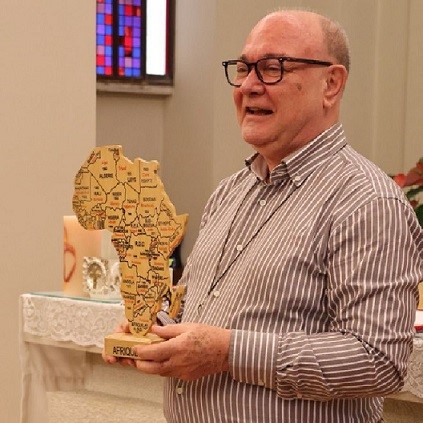
Andre, whom we welcomed at last year’s Provincial Chapter, was a promoter of Justice and Peace for the Laity of the Chevalier Family.
He made this statement as he completed his term as MSC First Counsellor.
On First Fridays, we usually publish the JPIC poster. It arrived late this month so we take th opportunity to post it today – and in the JPIC context.
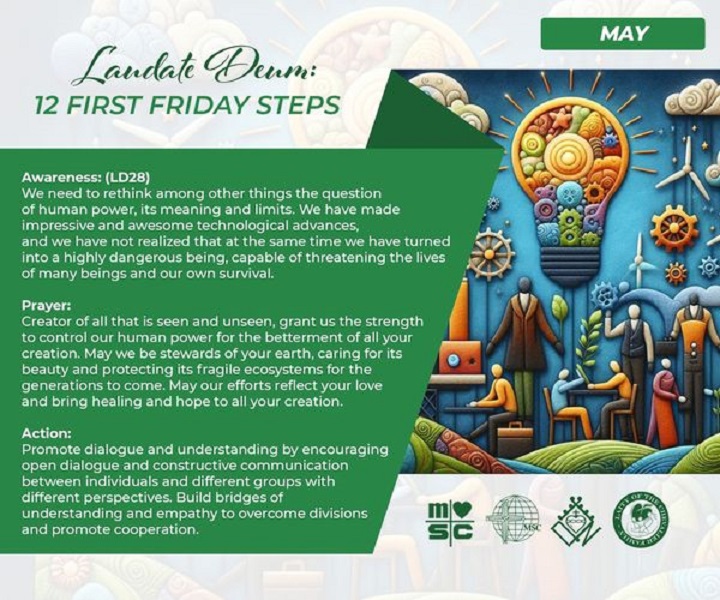
Apart from their territorial responsibilities, each team member has a specific portfolio. For me, JPIC has been a passion for a long time. Since the 2017 chapter, we have tried to make progress in this area as a “Chevalier Family”. Of course, each entity chooses its actions according to the priorities dictated by the situation on the ground. But since 2015, Pope Francis has invited humanity, in his encyclical Laudato Si, to combat climate change and take greater care of our common home, the earth.
We have promoted this through the action/prayer on the first Friday of the month, which has always been dear to our congregations. We are not alone; what we do together, we do better! We are also committed to the 7-year plan developed by the World Movement Laudato Si.
Entities that have yet to become involved are invited not to stand by and watch. The Pope says that action is urgently needed, and everyone must get involved. It’s not just ecological conversion and climate change that need to be tackled, but other injustices and violations of human rights are also on the spot. It is justice that creates lasting peace!
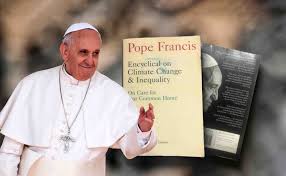
Despite COVID, these six years at the Generalate and in the world were a great challenge and a considerable personal enrichment. Not all projects came to fruition. I have seen the vitality of our Congregation, especially in the southern hemisphere. Organising North-South solidarity and invol- ving more confreres in the Commitment for a Better World (JPIC) is challenging for our mission under the aegis of the Spirit and the new General Administration.
I remain convinced that the promotion of international collaboration and the formation of intercultural communities is the emerging future that will enable our mission to progress “ubique terrarum”. Our world is changing at a dizzying pace, with a widening gap between the rich countries and with a widening gap between the rich countries and the countries of the South that are suffering most from climate change. The challenges and responsibilities for our communities are enormous if we are to fulfil our prophetic vocation in a synodal Church. Avanti!
André Claessens, msc

